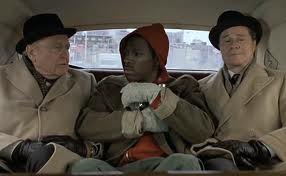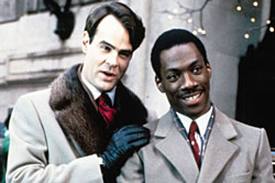Editor’s Note: With the Academy Awards drawing near, TLNT asked a number of prominent thought leaders to write about their favorite movie with a management or HR theme. We’ll feature one a day up to the Oscar ceremony on Feb. 27.
By Steve Boese
You have an important hire to make. It’s an important role. One that will directly impact the results for your team, and the broader organization as well. Here are your final two candidates:
- Candidate A – An individual with the ‘right’ education, a Yale or Harvard man; solid professional certifications, well documented and verifiable prior work experience, and (not inconsequentially) the typical and expected ‘look’ – clothes, accessories, mannerisms, etc. of the usual person that performs the job. In fact, a person so similar to others in your organization that ‘fit’ seems to be guaranteed. After all, you all like the same things, know the same people.
- Candidate B – Someone with less impressive resume credentials; instead of a Ivy League MBA, perhaps a bachelors from a state college. Work experience from employers more likely to be found on a list of casual dining options than on any Fortune magazine list. A suit right off the rack from Men’s Wearhouse. References that include an adjunct instructor at a community college and a local restaurant manager.
Which option gives you the best chance at a successful hire? Which candidate is the better gamble? Does it even matter all that much which one you choose?
It’s been a question for Human Resources and recruiting professionals for, well, pretty much forever. And oddly enough, this was one of the themes of the 1983 Dan Aykroyd/Eddie Murphy movie Trading Places.
In the film, the two wealthy brothers who own the commodities brokerage Duke & Duke make a wager aimed at discovering if, by simply swapping the environments of a rich, successful and properly pedigreed person, Louis, (played by Aykroyd); with the con-artist, street hustler, Billy Ray (played by Murphy); will lead to a corresponding change in behaviors, attitudes, and outcomes on the job.

And perhaps obviously, it does. Street hustler Billy Ray, once given rudimentary training in the nature of the commodities business, emerges as a successful and profitable new member of the staff at Duke & Duke. Meanwhile, properly pedigreed Louis, stripped of his customary support, surroundings, and advantages, descends into crime, paranoia, and near insanity.
The simple lesson of the film is that having the ‘right’ background and qualifications are not necessarily needed for success, and that attitude, motivation, and common sense, when combined with just enough opportunity, can produce an environment where a person with a more modest or non-traditional resume can succeed, despite perceived limitations or handicaps
So what? We all know this, or at least when pressed, would find ourselves in agreement with these basic conclusions. But there is a huge difference from knowing something is true and actually changing behaviors and practices that not only acknowledge this truth, but seek to exploit it for the betterment of the organization and the ‘non-traditional’ candidates that are so commonly bypassed.
Would someone like Billy Ray ever have the chance to interview for any position at Duke & Duke, much less a high-profile, high-impact role that he was given as part of the experiment?
Everything about Billy Ray was different than Louis, and different from the model of what would have been considered a typical Duke & Duke recruit. Not much formal education, no experience in commodities trading, and a sketchy background including some brushes with the law.

No doubt if Duke & Duke had some kind of ‘diversity’ philosophy or had brought in a Director of Recruiting that had a more expansive sourcing strategy, there is still almost no chance Billy Ray would have been found or given an opportunity to interview.
And certainly, in the world of broadly drawn comedy characters, that makes perfect sense. Duke & Duke couldn’t succeed in the highly competitive world of commodities trading by recruiting homeless Philadelphia street hustlers like Billy Ray.
No, to stay on a level playing field in high finance, the Dukes had better stick with fighting against every other financial firm over the new class of Harvard and Penn MBAs. The surest way to win is to do just exactly what every one of your competitors does. Heck, they have to know something, right?
Let someone else take a chance on Billy Ray. No recruiter ever got fired for hiring Ivy League MBAs.
